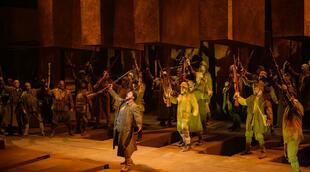 © A. Bofill / Liceu
© A. Bofill / Liceu
Il Trovatore, the opera that is supposed to be performed in A night at the opera (1935), the immortal Marx brothers film, has always been called in modern - and not so modern - times a surviving opera in the repertoire thanks to its musical excellence despite its deliriously absurd and exaggerated plot.
In this sense, its companions in the 'popular Verdian trilogy', Rigoletto and Traviata, benefit from supposedly higher quality arguments.
That is not true, Il Trovatore, based on a play by the Spanish romantic dramatist Antonio García Gutiérrez, presents us with an unbeatable plot, a real theatrical gem, with an angry mother who, as revenge, wants to throw her enemy's son into the fire, but, surprisingly, by mistake throws her own son into it; two rival armed groups that casually coincide on stage with the intention of kidnapping the same person at the same time; a beautiful suicide on stage to preserve sexual fidelity - "M'avrai, ma fredda esanime spoglia" - and a baddie who discovers that he has not killed his worst enemy but his own brother who disappeared years ago. And all this is presented in the context of a war in Aragon at the beginning of the 15th century. It is hard to understand how the producers of Batman or Spiderman, films with arguments much more boring and predictable than Il Trovatore, have not yet bought the rights for a blockbuster or a television series based on the work of García Gutiérrez.
The coproduction of Il Trovatore that currently occupies Liceu's stage, comes from the Dutch National Opera in Amsterdam (2014) and the Opéra National de Paris (2016), and later it will be seen in Rome.
Signed by Alex Ollé as stage director, the work is set in the context of the First World War, a conflict close enough to be shocking and visually surprising and distant enough to have entered the mythical sphere. The First World War is useful for everything and has become a real gold mine, perhaps overly exploited, by stage directors and scenographers. Claus Guth's great Parsifal that will return to Liceu next May, Wozzeck from last February and even a Fille du Régiment from a few seasons ago are all set in that war that offers such good visual opportunities. The First World War has definitely become a stage.
The context of the First World War ends, however, with the costumes and gas masks of the choir, as the dark and powerful scenography by Alfons Flores, splendidly lit by Urs Schönebaum, is totally abstract. It does not refer to any specific historical moment and could serve as well for Il Trovatore as for Tannhäuser. In this very versatility lies its weakness. In theatre everything that is not 'pertinent' is 'impertinent'.
The movement capacity of the scenography with rectangular prisms that constantly rise and fall (perhaps too much) allows to symbolically recreate several spaces in which to act. Ollé makes good use of them for a dramaturgy that is sufficiently respectful of the original plot but that does not offer any particularly relevant depth in this drama consumed by clichés.
What was relevant was the great musical level that was achieved in this Trovatore. Riccardo Frizza, who has become one of the world leaders in Verdian conducting, obtained a very good performance from the orchestra, achieved sonorities of bel canto delicacy when appropriate and invigorated them with punctual orchestral outbursts when the scene so asked for it. His singing direction was also splendid, carefully following the breath of the singers and setting boundaries when someone (especially the tenor) went too far.
The voices were all of a high standard. Madrid soprano Saioa Hernández made a great Leonora. The style was impeccable and the voice was very beautiful and complete, with sufficient lower register, a rich and full center and a high register that perfectly covered the requirements of the role. Her "Tacea la notte placida" and the cabaletta that follows were memorable, later the level was very good and excellence returned with an exemplary death, sung as appropriate with only a thread of voice.
Vittorio Grigolo is a well-rounded Verdian tenor with a very beautiful timbre, bright top notes and very good projection. His only problem was overacting. His exaggerated gesticulation (sometimes it looked like a silent film) occasionally filtered into the singing which became excessively histrionic. It is the only criticism that can be made of a very complete and intense performance.
The performance of Juan Jesús Rodríguez in the role of Conte di Luna was also very good, he received long applause with "Il balen del suo sorriso" and his voice, wide-ranging, with a beautiful, robust and well-projected upper register, didn't falter throughout his all-around evil character.
The Uzbek mezzo-soprano Ksenia Dudnikova, who was debuting at Liceu, also succeeded in the role of Azucena. The voice, robust, obscure, with powerful lows and easy rises when the higher register was required, was ideal for the role of the gypsy.
The choir gave a great interpretation of the most famous choral parts of this opera whilst the precision and unanimity broke down slightly in the less popular parts.
To sum up; great voices for a Trovatore that, despite its renewed appearance, cannot escape the clichés.
Xavier Pujol
Barcelona, 3rd November 2022
Il Trovatore by Giuseppe Verdi. Saioa Hernández, soprano. Vittorio Grigolo, tenor. Ksenia Dudnikova, mezzo-soprano. Juan Jesús Rodríguez, baritone. Gianluca Buratto, bass. Orchestra and Choir from Gran Teatre del Liceu. Conductor, Riccardo Frizza. Stage director, Alex Ollé. Scenography, Alfons Flores. Costumes, Lluc Castells. Lighting, Urs Schönebaum. Coproduction by Opéra de Paris, Dutch National Opera. Gran Teatre del Liceu.
the 05 of November, 2022 | Print

Comments
To write a comment, you have to login.
No comments